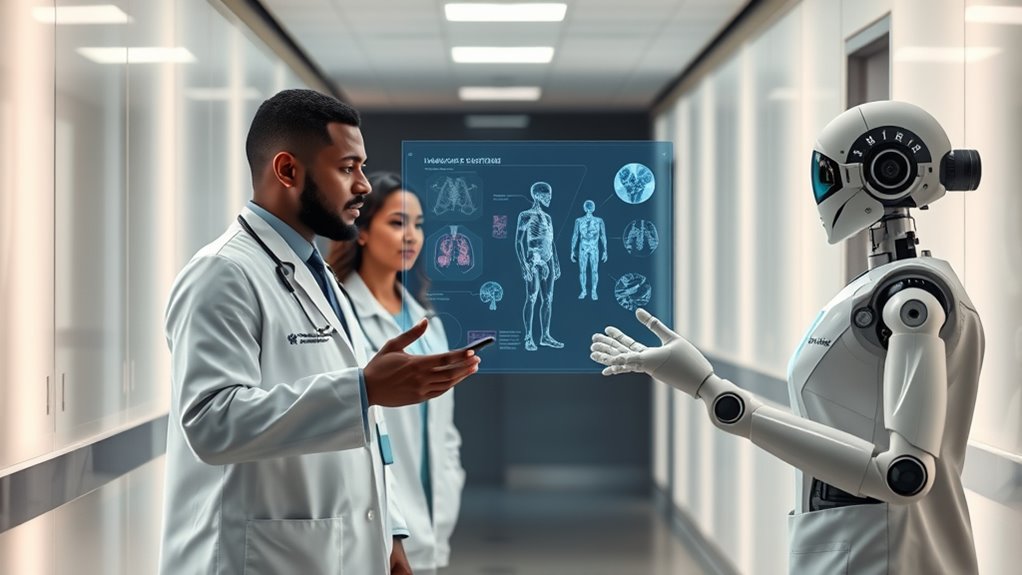You see it everywhere—doctors and AI now work hand-in-hand, transforming healthcare with augmented intelligence. You benefit from faster diagnoses, personalized treatments, and smarter workflows thanks to AI tools that analyze images, monitor patients, and handle administrative tasks. As AI continues to grow, it’s making care more accurate, efficient, and accessible. If you want to discover how this collaboration is shaping the future of medicine, keep exploring this exciting evolution.
Key Takeaways
- AI enhances diagnostic accuracy, enabling doctors to make faster, more precise decisions in patient care.
- Clinicians increasingly use generative AI tools for clinical documentation and administrative tasks.
- AI-driven predictive analytics help physicians identify high-risk patients early, improving outcomes.
- Augmented intelligence supports personalized treatment plans tailored to individual patient needs.
- Collaboration between doctors and AI fosters innovation, addressing healthcare workforce challenges and expanding access.

Have you ever wondered how artificial intelligence is transforming healthcare? It’s happening faster than you might think. Today, about 80% of hospitals use AI tools to enhance patient care and streamline operations, and nearly half of US healthcare organizations are just beginning to implement generative AI. This shift isn’t just technological; it’s reshaping how you, as a clinician, approach your daily work. In 2024, 66% of physicians report using some form of AI—more than double the number from just a year ago. Most see the benefits; 68% believe AI offers at least some advantage in their practice. Yet, many remain cautious, concerned about implementation challenges, guidance, and the lack of definitive clinical evidence.
AI’s applications in your practice are diverse and impactful. It enhances image analysis for radiologists and pathologists, leading to faster, more accurate diagnoses. Predictive analytics and real-time monitoring help identify high-risk patients early, enabling you to intervene sooner. Virtual assistants now handle patient intake, freeing you from administrative burdens, while natural language processing (NLP) transcribes clinical notes efficiently. AI supports your decision-making process, speeding up workflows and reducing errors, especially in triage and early disease detection. These tools are transforming diagnostic accuracy and patient outcomes. Additionally, the development of specialized algorithms tailored for specific medical conditions is expanding AI’s role in personalized medicine.
AI boosts diagnostics, streamlines workflows, and enhances patient care with image analysis, predictive analytics, and natural language processing.
On the operational side, AI improves efficiency by automating scheduling, claims processing, and documentation tasks. Ambient listening and AI-powered chart summaries lessen your documentation workload, giving you more time with patients. Analytics driven by AI inform policies and operational decisions, creating data-supported improvements across healthcare institutions. The market for AI in healthcare continues to grow rapidly, with projections reaching over half a trillion dollars by 2032. What was once experimental is now becoming integral to daily healthcare delivery, enabling your organization to function more effectively.
The market for AI in healthcare continues to grow rapidly. By 2032, it’s projected to reach over half a trillion dollars, with North America leading the way. Significant investments from both public and private sectors are fueling innovation—advancing diagnostics, drug discovery, robotic surgery, and patient monitoring. However, challenges remain. Concerns about data bias, legal issues, and ethical considerations persist, and regulatory oversight is expected to tighten. Despite these hurdles, AI’s potential to expand access, address workforce shortages, and improve global health outcomes is undeniable. As a healthcare professional, you’re at the forefront of this transformation—where doctors and AI unite to redefine the future of medicine.
Frequently Asked Questions
How Will AI Impact Doctors’ Traditional Roles?
AI will change your traditional role by shifting your focus from routine tasks to oversight and collaboration. You’ll spend less time on documentation and more on complex clinical judgment and patient interaction. You’ll also participate in developing, tuning, and troubleshooting AI systems, expanding your responsibilities. While AI enhances efficiency, it emphasizes your unique expertise, ensuring your critical role remains essential in delivering personalized, empathetic care and maintaining clinical decision-making authority.
What Are the Ethical Considerations of AI in Medicine?
You need to consider AI’s ethical challenges in medicine, like protecting patient data privacy and ensuring fairness by avoiding biases. You should be transparent about AI’s role in diagnosis and treatment, and guarantee patients give informed consent. Accountability is vital if errors occur, and you must balance AI’s benefits with risks. Promoting health equity and fostering public trust require ongoing evaluation, clear policies, and collaboration among clinicians, developers, and ethicists.
How Do Patients Feel About Ai-Assisted Diagnoses?
Patients prefer and positively perceive AI-assisted diagnoses, especially when supported by their doctors’ explanations. You might feel more comfortable with AI as a supportive sidekick rather than a sole solution, especially for serious conditions. Familiarity fuels faith, so knowing AI’s accuracy and having your doctor’s guidance boosts trust. While concerns about data privacy and liability persist, transparent talk and tailored care can transform trepidation into trust and acceptance.
What Training Is Needed for Doctors to Use AI Effectively?
You need training that covers AI fundamentals, machine learning techniques, and their healthcare applications. This includes understanding data interpretation, AI workflow integration, and evaluating diagnostic accuracy. You should also learn about ethical, legal, and privacy concerns, along with hands-on workshops to practice applying AI tools in clinical settings. Continuous education, specialized courses, and collaboration with AI experts will help you stay current and use AI confidently and responsibly in your practice.
How Is AI Regulation Shaping Medical Practice?
You’ll notice that over 20 states introduced bills in 2025 to regulate AI in healthcare, shaping how you practice medicine. These laws require human oversight, disclose AI use to patients, and restrict AI from impersonating licensed providers. Additionally, regulations in six states ensure insurance decisions with AI are reviewed by professionals. This evolving framework emphasizes safety, accountability, and fairness, guiding you to integrate AI responsibly while maintaining high-quality patient care.
Conclusion
As you embrace augmented intelligence, you become the lighthouse guiding patients through the fog of uncertainty. AI acts as your steady beacon, illuminating unseen details and empowering your decisions. Together, you forge a symbiotic bond—human intuition and machine precision—shaping a future where healing is a shared voyage. In this union, technology isn’t just a tool; it’s the compass leading you toward a horizon of safer, smarter care.









